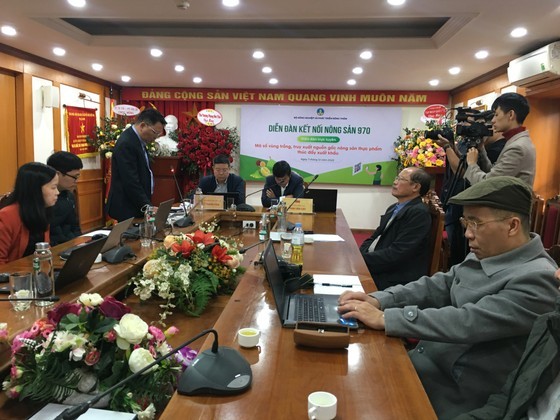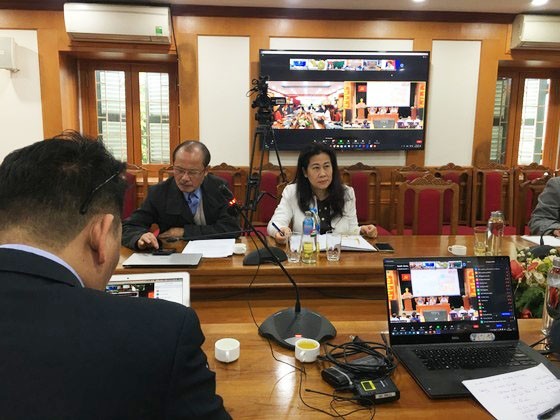 The 970 Agricultural Product Connection Forum is held on December 7 in Hanoi. (Photo: SGGP)
The 970 Agricultural Product Connection Forum is held on December 7 in Hanoi. (Photo: SGGP)
On the morning of December 7, the Working Group of the 970 Agricultural Product Connection Forum under the Ministry of Agriculture and Rural Development (MARD) held a forum on building facilities, growing area codes, and traceability of agricultural and food products to promote exports and looking back a year following the GACC's Decree 248 and Decree 249.
The forum, held online and offline, had the attendance of associations, cooperatives, manufacturing and trading enterprises, retailers, and distribution systems from many provinces and cities across the country.
According to the MARD, in 2022, the ministry and the GACC signed five protocols requiring plant quarantine for agricultural products, including durian, banana, passion fruit, sweet potato, and edible bird's nest. This has opened up great opportunities for Vietnamese agricultural products to be exported to the world's most populous market. However, opportunities always come with challenges when the Chinese market is increasingly tightening food quality and safety.
The forum, held online and offline, had the attendance of associations, cooperatives, manufacturing and trading enterprises, retailers, and distribution systems from many provinces and cities across the country.
According to the MARD, in 2022, the ministry and the GACC signed five protocols requiring plant quarantine for agricultural products, including durian, banana, passion fruit, sweet potato, and edible bird's nest. This has opened up great opportunities for Vietnamese agricultural products to be exported to the world's most populous market. However, opportunities always come with challenges when the Chinese market is increasingly tightening food quality and safety.
 Delegates participate in the online forum. (Photo: SGGP)
Delegates participate in the online forum. (Photo: SGGP)
According to Mr. Tran Van Cao, Deputy Editor-in-Chief of the Vietnam Agriculture Newspaper, one of the requirements stated in the protocols is that production facilities must have codes for growing and farming areas and packing facilities approved by the GACC for food safety management and traceability. At the same time, in April 2021, the GACC issued Decree 248 on “Regulations on the Registration and Administration of Overseas Producers of Imported Food” and Decree 249 on “Administrative Measures on Import and Export Food Safety”. Accordingly, foreign enterprises, including Vietnam, who want to export to the Chinese market, are required to comply with the new regulations outlined in these two orders, which took effect from January 1, 2022. Up to now, they have been deployed for nearly one year. Specifically, Vietnamese enterprises must register for export lists with the competent authorities of China. Mr. Ngo Xuan Nam, Deputy Director of the SPS Vietnam Office, said that according to the provisions of China's decrees 248 and 249, there are 18 groups of high-risk goods that require exporters to register directly with competent authorities of China. For the remaining groups, enterprises can register through the website of the GACC or entrust. As a result, by December 5, the GACC had granted 2,426 product codes to about 2,000 Vietnamese enterprises, a relatively high figure compared to other countries in the region, according to Mr. Nam.
 Mr. Ngo Xuan Nam. (Photo: SGGP)
Mr. Ngo Xuan Nam. (Photo: SGGP)
“Of the 2,426 product codes, 1,236 codes (accounting for more than 50 percent) are registered through the competent authorities, while 1,190 are registered and declared by enterprises themselves through the online registration system of GACC. Regarding the product category, seafood is the most with 802 codes, followed by some products, such as cashew nuts, coffee, vegetable oil, and flour. Functional food is the least," said Mr. Nam. According to Mr. Nam, the current difficulty is that many enterprises declare wrong product codes, so they are returned to redo. In addition, many enterprises have not yet mastered China's food safety standards. Currently, China has changed 10,092 residue levels of 564 types of food products and issued 36 national food safety standards since July. "We manufacture to sell to China, so we must understand these regulations," said Mr. Nam, and suggested avoiding the case that businesses that have not been granted codes but still export to China. The Deputy Director of the SPS Vietnam Office also noted that to meet the conditions for export registration with China, enterprises need to set up and operate a food safety and hygiene management system according to HACCP principles. For enterprises that made quick registration in 2021, it is necessary to promptly add registration information on the CIFER system according to China's additional requirements before June 30, 2023. Enterprises actively contact the competent authorities that they submitted the application to or SPS Vietnam Office for guidance. "After the above deadline, if enterprises have not completed the additional documents, their product codes will be removed from the list of China", Mr. Nam warned. Regarding edible bird’s nest product, Ms. Tran Thi Thu Phuong, a representative of the Department of Animal Health under the MARD, said that this is a special product, so China controls it relatively carefully, making many requirements, such as annual disease surveillance and monitoring plans in the following years. The list of swiftlet houses for export must be appraised, avoiding the situation of buying bird’s nests from other places for export, and export products must not be purchased in areas hit by the avian influenza epidemic within the last 12 months.
 Ms. Tran Thi Thu Phuong. (Photo: SGGP)
Ms. Tran Thi Thu Phuong. (Photo: SGGP)
Like other products, enterprises exporting and raising swiftlets must register with the competent authorities, must send the list to the GACC, and at the same time, must be supervised by the veterinary authority. To meet the requirements of China's decrees 248 and 249, the Department of Animal Health will take samples at the swiftlet houses to check the quality. “From 2019 to now, we still take samples for testing, but the frequency is only twice a year. To meet the requirements of the importing country, we will increase the frequency," Phuong said. Along with that, the authorities will make the planning of the area for raising swiftlets and grant codes for swiftlet houses. Meanwhile, Dr. Phan Thi Thu Hien, a representative of the Department of Plant Protection, said that Vietnam has seven traditional export fruits, including mango, dragon fruit, longan, litchi, watermelon, rambutan, and jackfruit, and five fruits exported in the form of signing the protocol, namely mangosteen, grass jelly, durian, banana, and sweet potato, that are allowed to be exported to the Chinese market. However, at present, China is no longer an unfastidious market, and there are many changes. Specifically, China requires strict control of goods crossing the border, especially in the form of border trade and unofficial quota export. Moreover, China also requires negotiations to open the door for each type of product and re-sign the export protocol for eight traditional fruits with the same management form as for mangosteen and durian, requiring the declaration of growing area and packing facility codes. Vietnam is temporarily exporting passion fruit and fresh chili. The products that are continuing to be negotiated to open the market are pomelo, custard apple, coconut, bell fruit, and lime. Export shipments must have a phytosanitary certificate and must not be contaminated with plant quarantine objects of China.
























